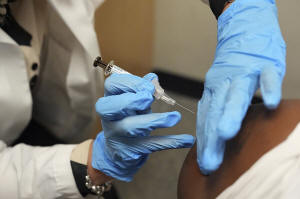States are taking steps to ease access to COVID-19 vaccines as they
await federal recommendation
[September 13, 2025]
By GEOFF MULVIHILL
The governors of Arizona, Illinois, Maine and North Carolina on Friday
joined the growing list of Democratic officials who have signed orders
intended to ensure most residents can receive COVID-19 vaccines at
pharmacies without individual prescriptions.
Unlike past years, access to COVID-19 vaccines has become complicated in
2025, largely because federal guidance does not recommend them for
nearly everyone this year as it had in the past.
Here's a look at where things stand.
Pharmacy chain says the shots are available in most states without
individual prescriptions
CVS Health, the biggest pharmacy chain in the U.S., says its stores are
offering the shots without an individual prescription in 41 states as of
midday Friday.
But the remaining states — Arizona, Florida, Georgia, Louisiana, Maine,
North Carolina, Oregon, Utah and West Virginia, plus the District of
Columbia — require individual prescriptions under the company's
interpretation of state policies.
Arizona, Maine and North Carolina are likely to come off that list as
the new orders take effect there.
“I will not stand idly by while the Trump Administration makes it harder
for Maine people to get a vaccine that protects their health and could
very well save their life,” Maine Gov. Janet Mills said in the
statement. “Through this standing order, we are stepping up to knock
down the barriers the Trump Administration is putting in the way of the
health and welfare of Maine people.”

Democratic governors have been taking action
At least 14 states — 12 with Democratic governors, plus Virginia, where
Republican Glenn Youngkin is governor — have announced policies this
month to ease access.
In some of the states that have expanded access — including Delaware and
New Jersey earlier in the week and Illinois on Friday — at least some
pharmacies were already providing the shots broadly.
Friday's orders are expected to change the policy in all three states
where they were put into place.
North Carolina's orders were narrower than most. They apply to everyone
age 65 and over and people who are at least 18 and have a risk factor.
Other adults would still need prescriptions. Officials said the order
takes effect immediately, but that all pharmacies might not have
supplies on hand right away.

[to top of second column]
|

Pharmacy manager Aylen Amestoy administers a patient with a vaccine
protecting against human papillomavirus (HPV), at a CVS Pharmacy in
Miami, Tuesday, Sept. 9, 2025. (AP Photo/Rebecca Blackwell)
 While most Republican-controlled
states have not changed vaccine policy this month, the inoculations
are still available there under existing policies.
In addition to the round of orders from governors, boards of
pharmacy and other officials, four states — California, Hawaii,
Oregon and Washington — have announced an alliance to make their own
vaccine recommendations. Of those, only Oregon doesn't currently
allow the shots in pharmacies without individual prescriptions.
Vaccines have become politically contentious
In past years, the federal government has recommended the vaccines
to all Americans above the age of 6 months.
This year, the U.S. Food and Drug Administration approved them for
people age 65 and over but said they should be used only for
children and younger adults who have a risk factor such as asthma or
obesity.
That change came as U.S. Health Secretary Robert F. Kennedy fired
the entire Advisory Committee on Immunization Practices in June,
accusing of them of being too closely aligned with the companies
that make the vaccines. The replacements include vaccine skeptics.
Arizona Gov. Katie Hobbs, a Democrat, framed her order Friday as
“protecting the health care freedom” of people in the state.
One state has taken another stance on vaccines
Florida's surgeon general, Dr. Joseph Ladapo, announced this month
that the state could become the first to eliminate requirements that
children have a list of vaccinations.
Since then, though, the state health department said that the change
likely wouldn't take effect until December and that without
legislative action, only some vaccines — including for chickenpox —
would become optional. The measles and polio shots would remain
mandatory.
___
Associated Press writer Patrick Whittle in Maine contributed to this
report.
All contents © copyright 2025 Associated Press. All rights reserved |